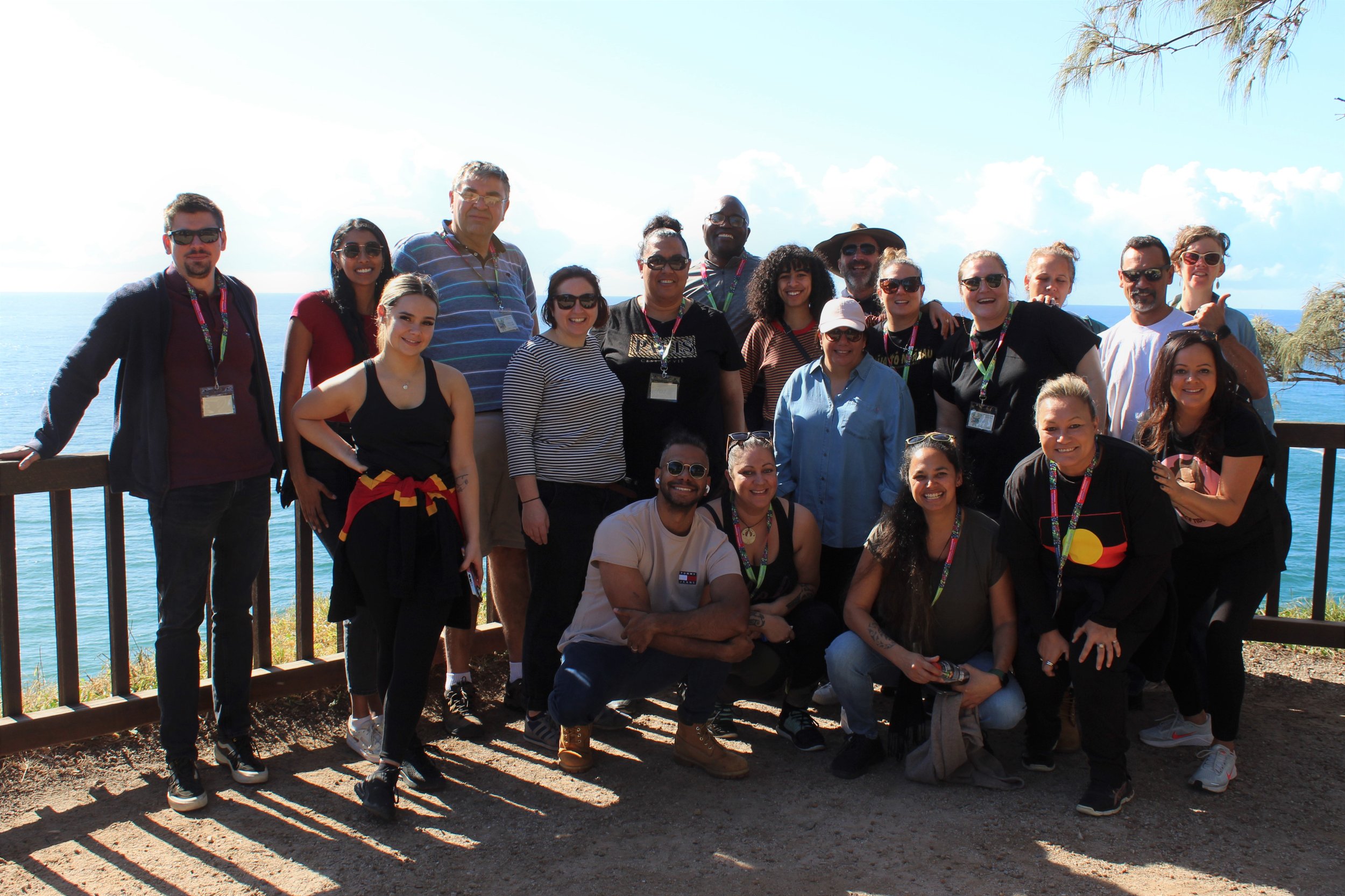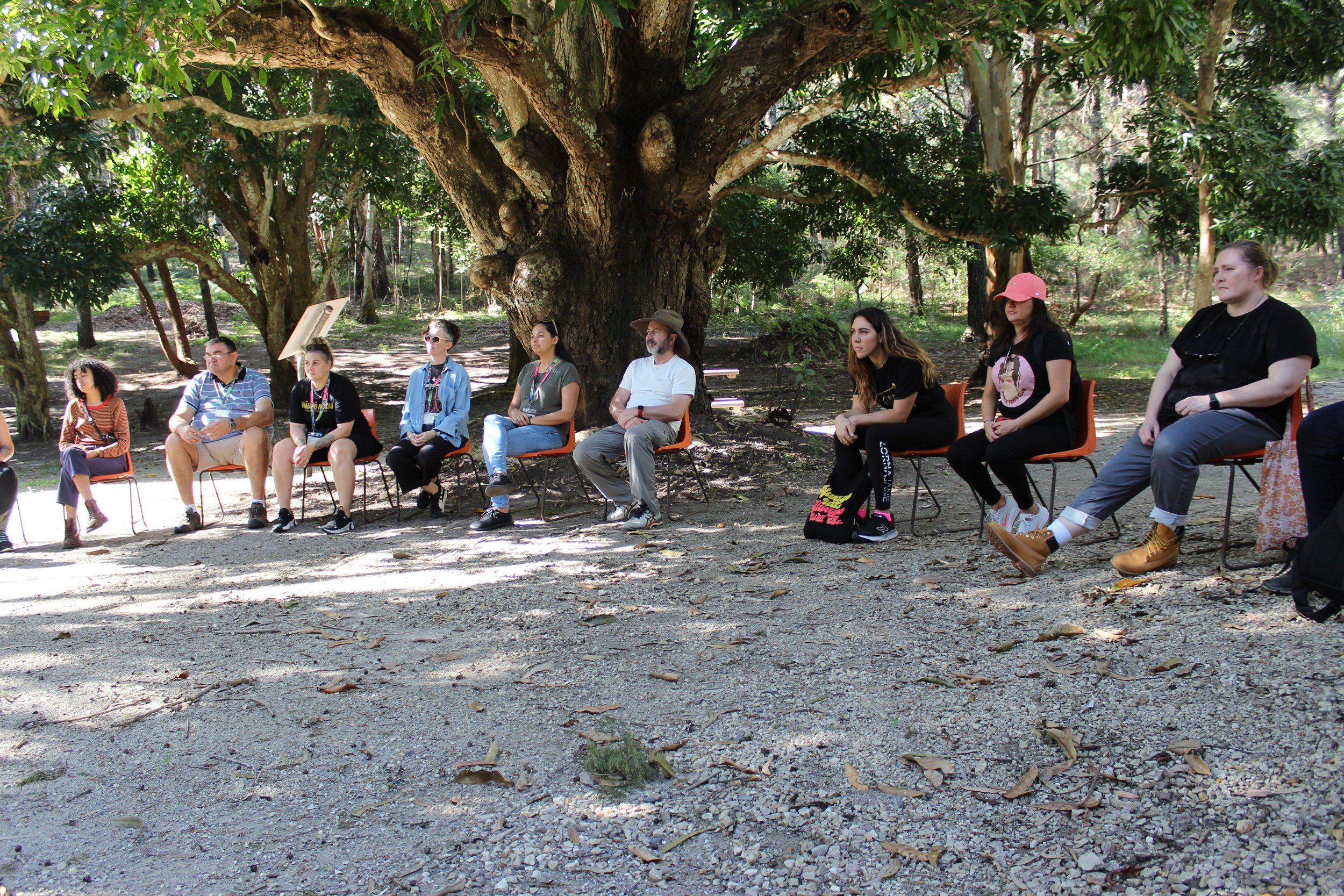Learning on Country – reflections of immersive learning experiences
Although indigenous cultures and worldviews throughout Australia, Aotearoa and the Pacific are diverse and embody many local differences; connections to land and place are shared foundations of our ways of knowing, being and learning and are inseparable from our identities.
Atlantic Fellows for Social Equity (AFSE) takes a unique approach to immersive learning environments, providing Fellows the opportunity to explore ‘place’ as a critical tool for collaborating with Indigenous people, anchoring project work in histories of land and as an essential element of thoughtful and ethical leadership. During 2022, the AFSE cohort travelled to Minjerribah (North Stradbroke Island) and Aotearoa as part of the foundation year of the Fellowship. Below, Fellows talk about their participation in the these immersive learning experiences and the importance of connection to land in place-based learning environments.
Tegan Burns 2021 Atlantic Fellow for Social Equity, Quandamooka woman from Tjerrangerri / Minjerribah (North Stradbroke Island, Queensland).
I'm lucky enough to live and work on Country, so a lot of the things that I was writing about for my assessments during my foundation year in 2021 were linked to work that I was doing here in my community and on this land. For me, Country plays such an important role; it's who we are, it's how we identify ourselves. When Mob meet, it’s the first thing we ask: Where are you from? Where’s your Country? Who's your mob?
There are stories that are embedded within the landscape that you can only learn and experience by being in that place and on that land. Being able to host other cohorts here in 2022 was a special experience for me. We talk about how we are in and of the land, we never think of ourselves as being superior to that plant or that animal, we are part of the same ecosystem. Plants and animals are our brothers and sisters and we all need to care for and look after one another to coexist together, just like a family. It was empowering for me to be able to have the 2022 AFSE cohort come and connect with me here on my Country Tjerrangerri / Minjerribah (North Stradbroke Island).
I'm not the most confident person when it comes to talking in front of people. But being on Country, I feel strong, and able to connect and communicate and teach and share my story because I am grounded and I feel my ancestors around me.
How do these experiences of ‘being on Country’ inform your project work?
When I started my project, I really wanted to focus on the strength and resilience of my people, Quandamooka people. We know there is intergenerational trauma within our families and within our communities. But I also see the strength and resilience within my community and I really wanted to capture that. As my project developed, it became intertwined with my connection to Country and the role that connection plays in building on our strengths. I began interviewing members of my community from Elders through to young people about how their connection to Country impacts and influences their lives. I focused on one area of the island, with the aim to eventually turn the project into a short film series capturing different significant places.
“The role of Country within the work that I do and within my project work is both significant and essential. Capturing those stories of connection across different generations, from an Elder down to the youth in our community and what that connection to their land means to them, is essential to privileging the lives and voices of Aboriginal people and Aboriginal land.”
I was not only able to share these connections with the new cohort of Fellows during the host exchange, but the experience also provided an opportunity for the Minjerribah Moorgumpin Elders to cater for the group and prepare native food from the island. It takes a lot of time and energy to go out and gather the fruits and berries, and all the different seafood. It was a really special experience for the group and people were emotional while they were eating their lunch because of that deep connection, and the abundance of beautiful foods that nourishes us from the land and sea. This became part of the learning and sharing experience.
Christian Lugnan, Gumbaynggirr man based in Garlambirla (Coffs Harbour, New South Wales, Australia)
What is the benefit for you of on-Country learning?
Yidaa Jalumbaw, Yidaa Yilaana, Goori-gundi Wajaarr. - Always was. Always will be Aboriginal land.
For me as an Indigenous person, mindalaygam Wajaarrda learning on Country and immersive educational approaches are essential as you can't learn about Indigenous knowledges just via textbooks or by someone sharing information in a workshop or a seminar. Certainly, with the North Stradbroke Island experience, the way I learn best is to feel, touch, see, and smell the place or Country the knowledge is coming from. When you're learning from people who are from that land and you are on that land, you're getting firsthand experience and knowledge from them that you won't get through any other mechanism.
“As indigenous peoples, we connect through our relationship to Country and we are all connected through sea Country. Although we are separate people(s), Māori and Goori people (Aboriginal and Torres Strait Islander people), sea Country connects us all and keeps us grounded and together. It is our way of understanding each other.”
Learning on Country is also a safe way for us Mob to learn, we can respect our protocols of welcoming others and tell our stories in the way we need to. You can't get that through other means.
It’s one thing to live on your own Country and learn from your knowledge holders and the people who have certain responsibilities or knowledge of particular areas. But it's such a lovely thing to visit other people’s lands because those people who you're meeting and who are sharing with you are connecting with you on multiple levels. Whilst you're meeting with someone that is physically in front of you, you're actually meeting with their ancestors as well. It is a deep reciprocation of sharing.
Do you have a story that was a highlight for you being on Mijerribah - Stradbroke Island?
While I was on the Island, I saw there was a photo they had hanging up of a Gumbaynggirr Elder (who had passed); it was actually the grandfather of my wife's best friend. In the photo, Uncle Kenny was holding a rock, an axe head. I asked a couple of people there, “what’s that photo all about?” I was told the story of how the rock had been relocated by non-Aboriginal people down to Coffs Harbour and how Uncle Kenny had returned and gifted it back to the Island. It was about 20 years ago and none of us knew this story. That was a beautiful connection that I found my people had to that Country up there. It was very emotional and healing. This experience helped me to connect back to my own community and project work.
Learning on Country for me reiterates the importance of connection to our environment which gives us fullness and ongoing health and wellbeing. In the Country around us, we experience goodness, benefit and draw strength. Country also provides awareness and directness. When you're experiencing things with a group of people, County provides what is needed for connection with others.


